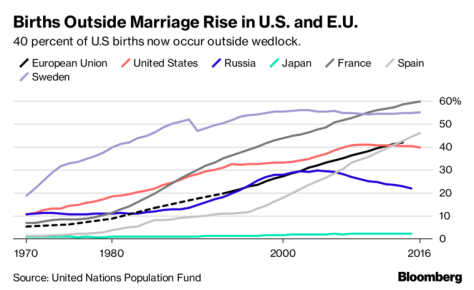
I spent some time talking to an atheist millennial recently. He considers himself a moral person, and he is very helpful to others. I asked him to define morality, and he said that morality was feeling good, and helping other people to feel good. I was trying to think of a way to punch a hole in his feelings-based utilitarianism. How could I show him that happy feelings are not a good basis for morality?
Now, you’re probably thinking that abortion is the most obvious example of something that is morally wrong – it’s just killing a baby because adults don’t want to take responsibility for their foolish pursuit of pleasure. But atheists typically don’t think of unborn children as people. They usually believe in naturalistic evolution, and they are committed to a view of reality where the universe is an accident, human beings are accidents, there are no objective human rights, and biological evolution progresses because the strong survive while the weak die. So you aren’t going to be able to generate a moral standard that includes compassion for weak unborn children on that scenario. If the rule is “let’s do what makes us happy”, and the unborn child can’t voice her opinion, then the selfish grown-ups win.
Instead, I decided to focus on fatherlessness. I asked him whether he thought that fatherlessness harmed children. Surprisingly, he said that it didn’t, and that he had a relative who was doing a great job raising fatherless kids. I asked him if he had ever looked at the research on what father absence does to children. He hadn’t. Then I asked him if a system of sexual rules based on “me feeling good, and other people around me feeling good”, was likely to protect children. He went silent.
Well, that was the end of that conversation. And I think it was a nice window into how millennials – who are absolutely clueless about what research says about sex, dating, marriage and parenting – think about relationships. They’re making decisions based on their feelings, then acting surprised when their “common sense” decisions based on happiness “in the moment” blow up in their faces, and destroy the lives of their children, including their unborn children.
Unfortunately, young people are having children outside of a marriage commitment more and more.

Far-left Bloomberg News reports:
Forty percent of all births in the U.S. now occur outside of wedlock, up from 10 percent in 1970, according to an annual report released on Wednesday by the United Nations Population Fund (UNFPA), the largest international provider of sexual and reproductive health services. That number is even higher in the European Union.
The EU has a higher rate of fatherless births because they have high taxes and big government to allow women to have children without having to commit to a husband:
The EU likely sees more births out of wedlock because many member countries have welfare systems that support gender-balanced child care, said Michael Hermann, UNFPA’s senior adviser on economics and demography, in an interview. Public health care systems, paid paternal leave, early education programs and tax incentives give unwed parents support beyond what a partner can provide.
More welfare and more government services make it easier for women to pursue relationships with men who aren’t interested in marriage. Hot bad boys who give them all the tingles. Big government makes those boring, predictable marriage-ready men dispensable. Big government also makes it much harder for a man who does marry to afford a stay-at-home mother for his kids, because he has to pay higher taxes for big government.
More:
The data show such births in the U.S. and EU are predominantly to unmarried couples living together rather than to single mothers, the report says.
[…]Jones also noted that the rise in births outside of marriage is closely correlated to delays in childbearing. “Women are claiming their ground professionally,” she said. “Delaying motherhood is a rational decision when you consider the impact it can have on your career, and that’s contributing to this trend.”
[….]The traditional progression of Western life “has been reversed,” said John Santelli, a professor in population, family health and pediatrics at Columbia’s Mailman School of Public Health. “Cohabiting partners are having children before getting married. That’s a long-term trend across developing nations.”
Regardless of marital status, more couples are choosing not to have kids at all. The U.S. fertility rate hit a historic 30-year low last year, according to the Centers for Disease Control and Prevention. Hermann said the rise in births outside of wedlock has actually mitigated the decline in fertility, which “would be much steeper if women weren’t having children outside marriage.”
What’s interesting about this anti-marriage article is that they have nothing to say about the research showing that cohabitation – and also marriages that occur after a period of cohabitation – are inferior to no-cohabitation marriages. People who are serious about self-control, and who are serious about committing through thick and thin, tend to have longer lasting marriages. But we don’t prioritize chastity, fidelity and self-sacrificial commitment anymore, because that relationships that require self-denial make us unhappy.
The article concludes: “We can’t go back to the ’50s”. Right. Because if feelings-based “morality” is assumed, then any choice between adult happiness and children’s happiness will favor the adults. Today’s young people carefully AVOID any evidence that contradicts their new “happiness-morality”. They act surprised when their unstable relationships dissolve, leaving children separated from their fathers. Marriage requires that both partners have a system of morality that puts the commitment above happy feelings. People have to be accustomed to doing things that feel bad, just because they are good and moral things to do according to an objective standard of morality. The new atheist morality of happy feelings doesn’t develop the character needed for commitment.
If you ask an atheist millennial, they think they are doing a great job of being “moral”. They don’t see the messes they are making for children as something that they are causing themselves, with their own foolish feelings-based decision-making. They think they know everything about relationships through their feelings. They think that they are exempt from the patterns of cause and effect in the peer-reviewed research.

I have not seen any research, but it seems common sense to me: many criminals and their criminal friends (think gangs), feel happy about the crimes they commit. Does that make them moral?
LikeLike
Utilitarianism fails precisely because different people find different things pleasurable, some of which are objectionable even to the utilitarian offering this ethical position. This exposes the fact that there is a higher moral standard at work by which they might say (for example) prostitution or dog fights are a step too far. It is these moral intuitions that expose our true beliefs, and our ethical theories are nothing more than attempts to systematize these intuitions. The real questions are where our intuitions come from, why we ought to obey them, and why we so regularly fail to. All secular attempts to explain such things arrive at the dead end of relativism.
LikeLiked by 1 person
Pedophilia “feels good” to pedophiles and “helps other” pedophiles “feel good” too.
And now Leftist academics are pushing the narrative that children can learn to enjoy sex with adults. So by that standard, even the victims of pedophilia can “feel good.”
Marxism has proven to make a lot of people feel bad. I wonder if this atheist supports Marxism? He probably thinks it will work this time.
LikeLiked by 1 person
It’s been processed into their thinking through public schools, politics, the media, Hollywood, and literature, which I don’t encourage. Then, with time, they find themselves surrounded by this everywhere they go: school, work, even some churches, neighbors, and their peers, such that, they feel in order to be on the “in crowd,” have friends, they must “raise their consciousness” and accept everyone’s opinions, except the right and traditional ones. But never fret. Keep understanding, speak what you understand, and if everyone does that, what is best will eventually prevail. Might take awhile. And if one’s wrong, that will eventually be discovered.
LikeLiked by 1 person